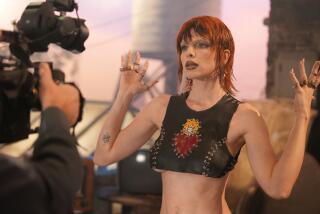BOOK REVIEW : Tangle of Racism’s Quirks, Fashion’s Dirt : FASHION SHOW: Or, the Adventures of Bingo Marsh, <i> By James Brady,</i> Little, Brown, $19.45, 288 pages
- Share via
Bingham Marsh III, fashion magazine mogul, haut WASP, eccentric, curmudgeon. What a guy!
Just listen: “Did God really mean for there to be black designers?” “I was pleasantly surprised. I thought an entire evening among Jews would be banal.” What an unforgettable character! How can a reader not love this upfront bigot, this Skull and Bones man who reads Enema Quarterly and whose classical allusions include Jason and the Astronauts? Easy.
As Archie Bunker proved, racists have to be utterly ineffectual to be tolerable. They have to be outrageous, much, much larger than life (and therefore unreal, incapable of doing harm) before they could even begin to be diverting. Unfortunately, Bingo Marsh of James Brady’s “Fashion Show” is smaller than life, a mere collection of prejudices and quirks.
But the people who buy Brady’s novel may not be interested in the largeness or smallness of the protagonist’s spirit. They want the dirt on the rich and stylish. Well? Does “Fashion Show” deliver the schmutz about the fashion industry?
After a fashion. There is plenty of gossip. The novel (according to Liz Smith’s column) is a roman a clef about Brady’s former employer, John Fairchild, the owner of Women’s Wear Daily. Its narrator, John Sharkey, is a hard-drinking journalist and, like Brady, an old Vietnam hand. Sharkey winds up in Paris after the war, writes a best-selling biography of Chanel and is lured by Bingo Marsh into leaving the New York Times to work as a columnist for the trendy weekly, Fashion.
But unlike the engaging characters in Judith Krantz’s “Scruples” (the only other novel about the fashion industry this reader has come across), who adore their work and each other, Bingo and Sharkey never come to life; they have no real passions, no authentic personalities. Bingo gossips a great deal, makes and breaks designers--and skips.
In fact the skipping is near-endless, exasperating. The reader begins to hope someone will stick out a foot. No such luck. “Marsh loved to hear people he knew being trashed, and he got up and skipped about a bit.” “To punctuate the fact it was only sport, he got up and skipped a little.” “Marsh was up again. And skipping.”
Now it may be that the real John Fairchild is a skipper extraordinaire, or that the skipping stands for some other Fairchildean idiosyncrasy that fashion insiders know and love. But footwork cannot substitute for character. And idle chatter about Ralph Lauren, Diana Vreeland, Bill Blass and Truman Capote, while pointed and, occasionally, deliciously cruel, cannot make up for lack of energy in this novel.
The characters move about a great deal, but nothing much happens in “Fashion Show.” Sharkey writes his column, goes out to grand dinner parties, sleeps with gorgeous models, meets a woman he cares about. Bingo compares Jacqueline Onassis’ legs (unfavorably) to Lee Radziwill’s, orders Sharkey to write a negative column about Leonard Bernstein, gets his company taken over by a British conglomerateur and retires. There are no heroes, no villains; there are no ethics, no morals; there is just dirt.
The characters are not just aggressively superficial; they are racist, sexist, xenophobic and incredibly crude. While bad behavior used to make for great fun in the fluffy comedy of manners--Thorne Smith’s “Topper,” Dashiell Hammett’s “The Thin Man”--we have grown a bit too serious, too politically correct, to be delighted any longer.
Late in the novel, Sharkey asserts: “I knew precisely what I was and who: a pretty good nonfiction writer whose small gifts fled when I approached the novel.”
This may be the most insightful sentence in “Fashion Show.” There is no artistic justification here for transforming fact into fiction. A pulls-no-punches recollection of John Fairchild by his former colleague might have made a great memoir.
In life, a proper Episcopalian who tells scandalous stories about the toilet habits and sex lives of the rich and powerful might be amusing company. But in art--or at least in “Fashion Show”--this Yalie is simply a boor, and a bore.
More to Read
Sign up for our Book Club newsletter
Get the latest news, events and more from the Los Angeles Times Book Club, and help us get L.A. reading and talking.
You may occasionally receive promotional content from the Los Angeles Times.








